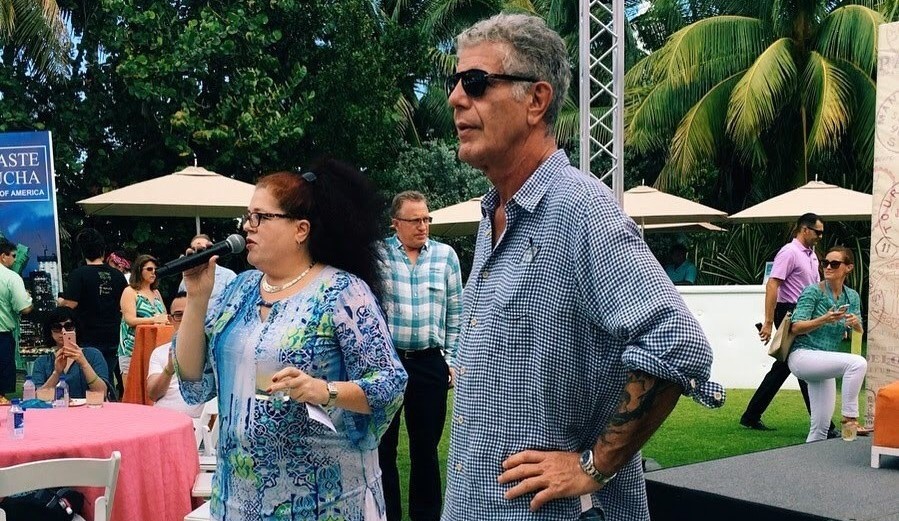
When I stepped into the media room at The Ritz-Carlton, Grand Cayman — hoping to grab a quick few moments with Anthony Bourdain, I was greeted by a host of other writers. Each had the same thing in mind. I wasn’t surprised but I couldn’t fight back the slight rise in my anxiety; I didn’t want to be bumped from the schedule. Time was of the essence and the interview slots were highly coveted to speak to the chef and host of CNN’s popular “Parts Unknown.” I had been seeing Bourdain, kicked back around the resort and shooting the breeze over drinks near the pool; I knew this was both work and downtime for him. I could tell, which he affirmed later, it was more of the latter. For him, the Cayman Cookout was time with friends. I made up my mind, after catching my first glimpse of him days earlier that even if I only had five minutes to talk with the veteran of numerous professional kitchens, that it would be more than enough.
AT: What drew you to the Cayman Cookout?
Anthony Bourdain: Eric is a very close friend and Jose is a very close friend, and it was a friends thing at first. And it’s become a tradition that’s really important to me.
AT: Did your mother’s career in the journalism field influence your writing?
Bourdain: Well, I don’t know. She was an editor not a writer, although she has written … She helped create an environment where words were important. I grew up surrounded by books and movies and music, and I think I owe that to both parents. That was really helpful to me and inspiring to me. Words were important.
AT: You said that you tried your first oyster on a fisherman’s boat as a child and that was one of the things that enlivened your love for food. What were some of the other fantastic things you ate as a child that drew into the culinary world?
Bourdain: Honestly, it wasn’t food that drew me into the culinary world. What drew me into the culinary world was that it was a culture that would have me. I was an angry kid … I fell in love with the subculture first, I think. I fell in love with the blue collar work where you knew how well you were doing on a day-to-day basis. You know … I like food and I guess going to France as a kid for a couple of summers was very influential; just eating a simple fish stew and things like that. And maybe seeing how much parents enjoyed it.
AT: If you ate the same meal every day, what would it be?
Bourdain: I could probably eat sushi every day.
AT: What would a cooking school with you at the helm focus on?
Bourdain: I don’t know that I should teach. I think a lot about the effect that “Kitchen Confidential” had in romaniticizing a culture that looking back was pretty toxic. I’m an old dude. I’m a product of that culture. I take an unattractive pride in having survived it. I don’t know that that would be useful … I don’t think that I could avoid communicating that to young people. I endured a lot of abusive behavior and I’m not going to compare it to surviving in the Marine Corps but when you survive a brutal system … I took pride in that and I don’t know that I should. So, I don’t know that I would or should. I’d love to teach creative writing some day. But, as a role model or teacher of preparing people to go into the restaurant industry, I’m afraid that I would over-sentimentalize or be nostalgic about a time that was not so wonderful.
– Katrice L. Mines

You must be logged in to post a comment Login